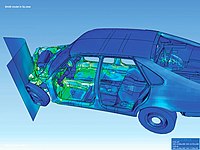
Photo from wikipedia
Abstract In this paper, by using proper orthogonal decomposition (POD) to reduce the order of the coefficient vector of the classical Crank–Nicolson finite spectral element (CCNFSE) method for the two-dimensional… Click to show full abstract
Abstract In this paper, by using proper orthogonal decomposition (POD) to reduce the order of the coefficient vector of the classical Crank–Nicolson finite spectral element (CCNFSE) method for the two-dimensional (2D) non-stationary Navier-Stokes equations about vorticity-stream functions, we first establish a reduced-order extrapolated Crank–Nicolson finite spectral element (ROECNFSE) method for the 2D non-stationary Navier-Stokes equations so that the ROECNFSE method has the same basis functions as the CCNFSE method and maintains all the advantages of the CCNFSE method. Then, by means of matrix analysis, we analyze the existence, stability, and convergence of the ROECNFSE solutions such that the theoretical analysis becomes very simple and convenient. Finally, we utilize some numerical experiments to validate that the numerical computational consequences are consistent with the theoretical ones such that the effectiveness and feasibility of the ROECNFSE method are further verified. Therefore, both theory and method of this paper is new and completely different from the existing reduced-order methods.
Journal Title: Applied Numerical Mathematics
Year Published: 2020
Link to full text (if available)
Share on Social Media: Sign Up to like & get
recommendations!